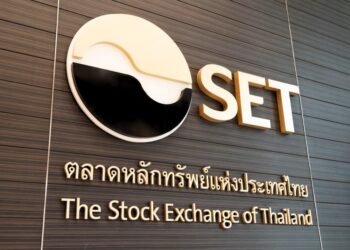No products in the basket.
As of September 27, 2024, the Thai stock market indexes, including SET, SET50, and SET100, showed declines, with SET closing at 1,450.15, down 4.88 points. Total trading value reached 60,569.97 million Baht. Notable stock movements included PTTEP, down 4% to 132.00 Baht, and EA, rising 10.12% to 9.25 Baht.
Key Points
- Market Overview (as of 27 Sep 2024):
- SET Index: 1,450.15, down 4.88
- SET50: 915.43, down 5.03
- SET100: 2,000.70, down 8.71
- Total Trading Value: 60,569.97 M.Baht
- Trading Summary by Sector:
- Institutional Trades:
- Buy: 5,531.44 M.Baht
- Sell: 6,961.06 M.Baht (Net: -1,429.62 M.Baht)
- Foreign Trades:
- Buy: 27,630.49 M.Baht
- Sell: 29,434.72 M.Baht (Net: -1,804.24 M.Baht)
- Individual Trades:
- Buy: 22,347.79 M.Baht
- Sell: 19,239.96 M.Baht (Net: +3,107.83 M.Baht)
- Top 5 Stocks:
- PTTEP: 132.00, down 4.00%
- EA: 9.25, up 10.12%
- KBANK: 149.50, down 2.92%
- BBL: 150.00, down 2.60%
- CPALL: 66.25, up 0.38%
Global Market Roundup: A Snapshot of Financial Trends
Forex markets have seen the dollar strengthen against several currencies as investors flock towards safe-haven assets amid caution surrounding inflation and global economic health. The US dollar index reached levels not seen in recent months, further impacting emerging markets with debt denominated in dollars.
Equity markets exhibited a mixed performance across major indices. In the United States, the S&P 500 declined slightly, reflecting concerns over rising inflation and its impending impact on interest rates. Investors are grappling with the Federal Reserve’s message on inflation control, leading analysts to predict potential rate hikes, which could dampen corporate earnings in the near term. In contrast, the technology sector showed resilience, buoyed by strong quarterly earnings reports from key players, underscoring the sector’s ability to navigate challenging economic environments.
Across the Atlantic, European indices faced headwinds as economic data from the Eurozone pointed towards slower growth. The latest manufacturing PMI numbers indicated a contraction, raising red flags about the region’s economic recovery. The European Central Bank’s stance on keeping rates stable amidst persistent inflation has left investors cautious, contributing to volatility in the markets.
In Asia, the ongoing tensions in the South China Sea and influencing factors from the Chinese economy have led to fluctuations in Asian markets. The Chinese stock exchanges displayed volatility as policymakers introduced measures to stabilize the economy. Investors are keenly observing the government’s approach to regulatory reforms, particularly in the tech and real estate sectors, which have experienced significant pressures in recent months.
Commodities have also played a vital role in the current market dynamics. Oil prices have shown upward momentum, propelled by supply concerns amidst geopolitical uncertainties in the Middle East. This uptick has significant implications for inflation rates, particularly in energy-dependent economies. Meanwhile, gold has remained a safe haven asset, attracting investors amid fears of economic instability and fluctuating currency values.
Discover more from Thailand Business News
Subscribe to get the latest posts sent to your email.














